Key events
Filters BETA
Starmer insists Labour just as committed to supporting Ukraine as government, saying UK ‘united’ on this
Keir Starmer has insisted that Labour party is just as committed to supporting Ukraine as the government. On a visit to Salisbury Plain, where he met British and Ukrainian solidiers, he told journalists that Britain was united on this issue. He said:
Six months after the start of the conflict in Ukraine, I’ve been here in Salisbury Plain watching Ukrainian troops being trained by British troops with live rounds, simulating the situation they are going to be facing.
That’s given me the opportunity to say and to reiterate Labour’s commitment and support for the Ukrainian people, and our unshakeable support for Nato and our allies.
I’ve been so impressed with the training I’ve seen here, that the global reputation of British forces is of grit, of class and that sort of steely determination and courage on the battlefield.
My mission, my message to the Ukrainian people, to our troops, our Nato allies, is that on the issue of defending Ukraine against Russian aggression, we stand united. We will not be divided politically in the United Kingdom on this and I’ve been able to deliver that message first-hand amongst this very, very impressive training.
If Liz Truss becomes prime minister, she could delay the next election until early 2025, according to the FT’s Sebastian Payne. In a long feature about her plans for government he writes:
Although many senior Tories assume that the next election will be in spring or autumn 2024, Truss may wait until January 2025, the last possible date one can be held. ‘Don’t rule out her waiting as long as possible if the economic cycle will benefit our chances,’ one ally said. ‘There is a lot to do and very little time left.’
The last election was held on 12 December 2019. It is generally assumed that a general election has to be held at least every five years, but the law just says a parliament can only last five years and so in practice a general election can take place around five years and a month or so after the last one.
John Major was the last prime minister who delayed a general election until the last moment, holding the 1997 one five years and three weeks after the previous one. It did not stop him being crushed by a landslide. But in 1992 he also delayed the election until almost the last possible date, and on that occasion he pulled off a surprise victory. In 2010 Gordon Brown held an election exactly five years after the previous one and he lost.
According to Payne, Jacob Rees-Mogg, the Brexit opportunities minister, will get a major job in Truss’s team – but not the levelling up portfolio, as some recent reports suggested.
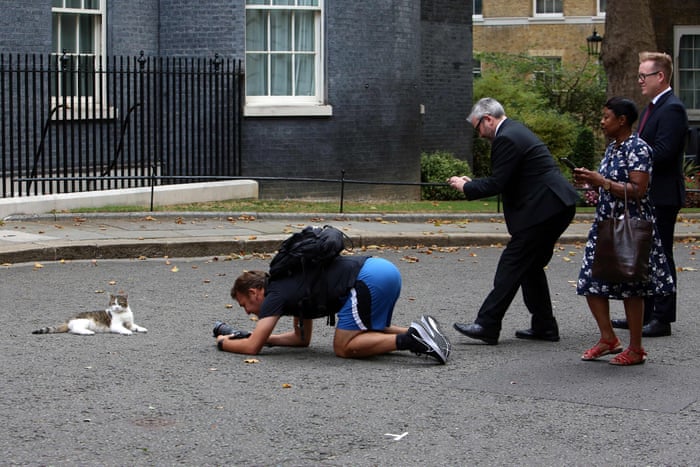
Unionists claim latest public spending figures for Scotland show Scots get ‘union dividend’ of £2,184 per person
The Scottish government has this morning published the Government Expenditure and Revenue Scotland (GERS) report for 2021-22. It is produced independently by government statisticians and it sets out how much government revenue is raised in Scotland, and how much government spending is directed at Scotland. Its publication every year provides new evidence for use in the debate about whether Scotland could afford to be independent.
There is a summary of the findings here, and the full report is here.
In its take on the figures, the SNP-led Scottish government says: “Scotland’s net fiscal balance has improved rapidly since last year, reflecting the economic recovery from the Covid-19 pandemic and the phasing out of pandemic health restrictions and support schemes.”
But Alister Jack, the Scottish secretary in the Conservative UK government, said the report showed how “people and their families [in Scotland] benefit massively from being part of a strong, resilient UK”.
In his formal response to the report Jack said it showed that public spending in Scotland per capita was £1,963 above the UK average in 2021-22, but that revenue per capita was £221 below the UK average. He said this meant the “union dividend” (the value of higher spending, making allowance for lower revenue) was equivalent to £2,184 for each person.
Other unionist politicians have made the same argument. Daniel Johnson MSP, the finance spokesperson for Scottish Labour, said the report showed that “independence would require tax increases or spending cuts at a time when these actions would shatter households as their bills spiral”.
The report confirms that Scotland’s net fiscal balance is worse than the UK’s. Here is the key chart. Jacks says it shows “Scotland’s deficit” standing at £23.7bn.
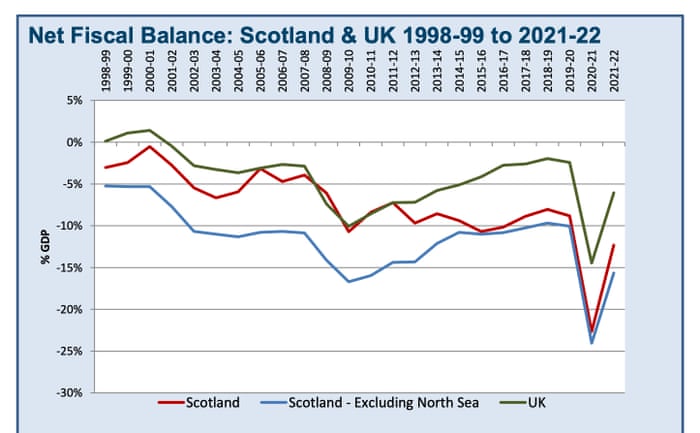
The Fraser of Allander Institute, an economic thinktank based at the University of Strathclyde, has produced a useful briefing on what the GERS figures mean. Here is an extract.
GERS takes the current constitutional settlement as given. If the very purpose of independence is to take different choices about the type of economy and society that we live in, then it is possible that a set of accounts based upon the world today could look different, over the long term, in an independent Scotland.
That said, GERS does provide an accurate picture of where Scotland is in 2022. In doing so it sets the starting point for a discussion about the immediate choices, opportunities and challenges that need to be addressed by those advocating new fiscal arrangements. And here the challenge is stark, with a likely deficit far in excess of the UK as a whole, other comparable countries or that which is deemed to be sustainable in the long-term. It is not enough to say ‘everything will be fine’ or ‘look at this country, they can run a sensible fiscal balance so why can’t Scotland?’. Concrete proposals and ideas are needed.
Truss says as PM she would declassify more UK intelligence to expose what Russia is doing to undermine west
Liz Truss, the foreign secretary and frontrunner in the Tory leadership contest, has said that if she becomes prime minister, she will declassify more UK intelligence to expose what Russia is doing to undermine the west. In an article for the Daily Telegraph she says:
When malign actors are ready to peddle falsehoods, our duty is to ensure the world hears the truth. That is why we set up the Government Information Cell to counter the Kremlin’s false narratives. We will continue to step up our work to counter the efforts of Russia and other authoritarian regimes to use disinformation to sow confusion and undermine global stability, drawing on the skills and tools at our disposal alongside our international partners.
I will go further as prime minister by doing everything possible – including declassifying more intelligence – to expose Putin’s playbook to the world. My government will use intelligence strategically to reveal the Kremlin’s attempts to undermine and destabilise freedom-loving democracies. Where there are lies, they will be exposed, where there is barbarism, we will call it out. I will take the same tough approach to counter malign activity from potentially hostile states and others who threaten global security.
She also says that as PM she will “do everything I can to ensure the flame of freedom in Ukraine continues to burn bright”.
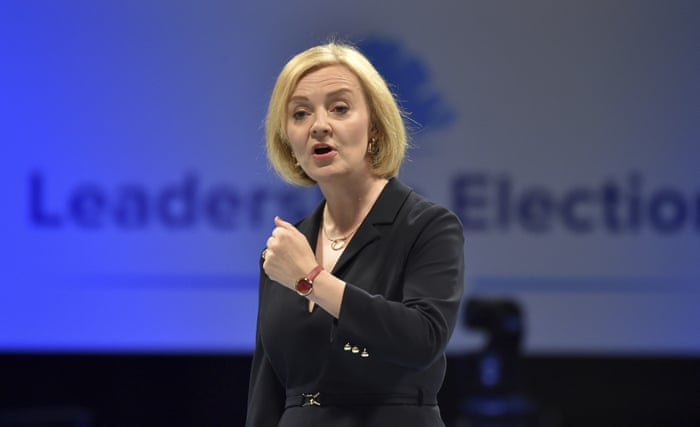
Shielding Britain’s households from energy crisis ‘will cost more than £100bn’
The energy industry’s favoured plan to shield Britain’s households from the soaring cost of energy will cost more than £100bn over two years, Keith Anderson, chief executive of ScottishPower, has confirmed. My colleague Joanna Partridge has the story.
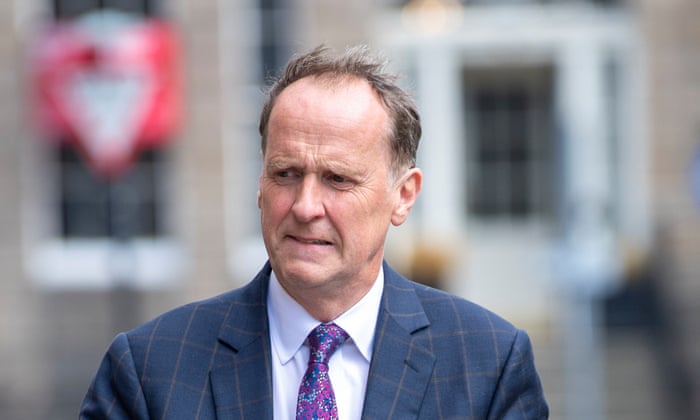
Russia in ‘very fragile position’ in war with Ukraine, says defence secretary Ben Wallace
Today is Ukraine’s independence day. It is also the six-month anniversary of the Russian invasion. Ben Wallace, the defence secretary, gave an interview to the Today programme to mark the occasion, and here are the main points he made.
I spoke to my intelligence chiefs this morning before coming on; Russia’s advance can be measured in metres per week, not miles.
It is grinding in small parts of the country in an attempt to advance – completely opposite of the three-days special operation that it touted at the beginning of this, six months ago.
We accept observations of Russian losses to be – if you combine deaths, injuries, desertions – over 80,000 of their armed forces. That’s 80,000 in six months compared to 15,000 they lost in a decade in Afghanistan.
I think we are in a position where Russia is in a very fragile position.
I think Ukraine is getting itself into that position. First and foremost, Ukraine already has had throughout this the moral component, as we call it in defence, and if you look at the morale of the Ukrainian forces, it is leagues ahead of the Russian morale, which is poorly-trained troops etc.
I don’t think that there’s been any wavering, I think that’s what Putin would love the world to do. It’s what he would fantasise, we’d all sort of go back to our sun loungers.
The simple reality is we see this as a direct threat not only to Ukraine, but to our values, and the world is still pretty solid and determined.
Now, of course, as we see, he will use gas as a weapon. I think we saw yesterday a reduction in parts of the gas pipeline into Europe, deliberately to drive up prices. But, of course, that is why he must not be allowed to be successful in Ukraine in the long term.
Wallace accepted that there had been “a few disagreements about the levels of sanctions” to be imposed on Russia amongst the international community, but overall it was “united against what Putin is doing”, he said.
-
He said some countries were wrong not to respond when Russia annexed Crimea in 2014. “The problem has been all the way back to 2014, [when] Russia invaded Crimea, illegally annexed it, and then it was allowed in some countries to carry on as if nothing had really changed,” he said.
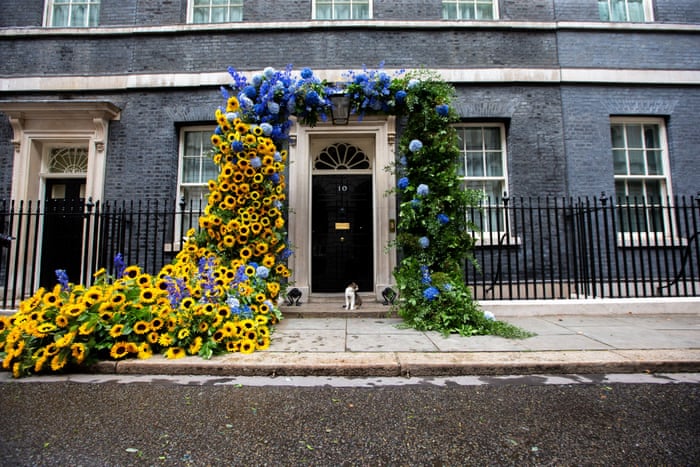
The rightwing Conservative MP John Redwood has welcomed Liz Truss’s refusal to commit to appointing a new ethics adviser for No 10 if she becomes prime minister.
Good news that Liz Truss does not want to appoint an Ethics Adviser. She will judge right and wrong with the whole country watching. There will be other posts she can do without in government.
— John Redwood (@johnredwood) August 24, 2022
Redwood was Welsh secretary under John Major, but he has not served in government since 1995 and he last sat on the Conservative frontbench in 2005. But he has been tipped for a ministerial job if Truss becomes PM.
Gavin Barwell, who was chief of staff for Theresa May when she was PM, says that, even if Truss can tell the difference between right and wrong herself, she will find it useful having an independent ethics adviser.
She will discover that when you have to sack one of your ministers – possibly a close friend – it is actually helpful to a prime minister to have an independent figure confirm that they have broken the ministerial code, rather than that having to be your judgement alone https://t.co/NR43RuoMLV
— Gavin Barwell (@GavinBarwell) August 24, 2022
Sunak says freezing energy price cap would require too much government borrowing
And here is a full summary of the main lines from Rishi Sunak’s interview with the Today programme.
-
He defended his decision not to back plans to freeze the energy price cap at the current level – saying this would require too much government borrowing. Labour and the Liberal Democrats are proposing an energy price cap freeze, and many energy companies also want to see the energy price cap frozen at the current level, alongside a mechanism being put in place to compensate them for the income they would lose. Sunak said that the energy companies had not spoken to him directly about their plan. (He seemed to be referring to the Scottish Power proposal for a £100bn rescue plan.) But he said this would involve too much borrowing. He said:
This is a challenge that is going to be with us for some time. And in that context, we need to make sure that what we’re doing is not only affordable, but also isn’t going to make inflation worse.
And at a time when we’re already borrowing an enormous amount of money, I think embarking on policies and programmes that add not just tens of billions, but tens and tens and tens and tens of billions of pounds on a permanent basis to our borrowing are risky, and that’s actually been a debate that we’ve had in this leadership race now.
I think that is a gamble with people’s savings, with their pensions, with mortgage rates, in making inflation become more embedded, and that won’t help anybody if that happens, because inflation makes everybody poor. It’s pernicious.
So, yes, I am nervous and sceptical about plans that are complacent about that risk.
-
He said plans that implied government did not need to make difficult choices were generally “too good to be true”. He made this point when he was specifically talking about the proposals to freeze the energy price cap, but he also made it clear that he thought some of Liz Truss’s plans came into this category. See 9.04am.
-
He said that, in stressing the need for government to take difficult choices, he was following the lead set by Margaret Thatcher. He mentioned her when asked to name the conservative thinker who had influence him most. He said that people who had worked with her endorsed his approach to tackling inflation, not Truss’s. He went on:
One thing I admire and respect about [Thatcher] … is that she was prepared not just to say the easy things that people may have wanted to hear, she said the things that may have been difficult to hear but were right for the country, and had the courage of her convictions. And that’s a standard that I hold myself to.
-
He refused to accept that Labour’s plan to freeze the energy price cap for the winter was fully costed. He said the proposal had been “wildly criticised for [the] credibility of that costing”. Sunak was referring in particular to Labour’s claim that £7bn to pay for the plan would come from lower government debt interest payments.
-
He implied that he was in favour of the government telling people to use less energy this winter. Asked if the government should be doing this, as other governments are in Europe, Sunak replied:
We have to look at all options available for us, and there are things that the builders and plumbing association have mentioned which I thought were quite sensible, about changing flow rates on boilers, which I didn’t know about which can help reduce energy usage without people seeing any real impact on how they consume energy. So we should be looking at all of these things.
Also I would embark on a programme of massive energy efficiency upgrades in people’s homes.
Rajan asked this question because the current government, and the Truss campaign, are resisting the idea that people should be asked to cut their energy use. This position has been fiercely criticised, for example by the FT columnist Sarah Connor.
Something you use has become wildly expensive & is set to become more so, but don’t try to figure out how to use less of it, whatever you do
— Sarah O’Connor (@sarahoconnor_) August 23, 2022
Rishi Sunak refuses to commit to voting for Truss’s emergency budget if she wins Tory leadership
Good morning. Rishi Sunak, the former chancellor who will only beat Liz Truss in the Tory leadership contest if multiple polls turn out to be completely wrong, has been giving an interview to the Today programme this morning. He has been accepting plenty of interviews recently, which may partly be related to the fact that he is a confident media peformer, but probably says more about the fact that, as the underdog in the contest, he has nothing to lose. In contrast, Truss has repeatedly refused invitations to setpiece media interviews.
Speaking to Amol Rajan, the Today presenter, Sunak refused to commit to voting for Truss’s proposed emergency budget in September if she wins. He has already indicated that he would not take a job in her cabinet because he disagrees so strongly with her plan to reverse the national insurance increase that he implemented as chancellor. (He sees it as an unfunded tax cut that would push up inflation and disproportionately benefit the rich.) At the Tory hustings last night in Birmingham Sunak dodged a question about whether he would vote for Truss’s plan if she won. Rajan tried again, and he told Sunak people would like to know whether he would vote against Truss’s planned emergency budget. Again, Sunak would not give an answer. He replied:
I’m not going to engage in these things partly because acting like this race is not over isn’t right.
But elsewhere in the interview he restated his claim that Truss’s tax proposals were essentially implausible. He said:
Governing is hard. Governing involves choices, it involves difficult trade offs.
Plans, whether they come from my opponent, or indeed the energy companies or anyone else, who seem to suggest that you can have absolutely everything you want, and you don’t have to make a difficult choice – that you can have lots of tax cuts, you can help people with the cost of living, borrowing doesn’t matter, inflation will take care of itself – if that all sounds a bit too good to be true, I think most people listening will think most things, when they do sound too good to be true, they probably are.
I will post more from the interview shortly. My colleague Gemma McSherry covered the hustings in Birmingham on the blog last night. You can read her coverage here.
Otherwise it looks relatively quiet today, but here are three things in the diary.
9.30am: The ONS publishs a report on the impact of sanctions on UK trade with Russia.
10am: Andy Burnham, the Labour mayor of Greater Manchester, joined Anas Sarwar, the Scottish Labour leader, in Glasgow at an event to discuss Labour palns to empower commmunities.
12pm: Nicola Sturgeon, Scotland’s first minister, takes part in an “In Conversation” at the Edinburgh fringe.
I try to monitor the comments below the line (BTL) but it is impossible to read them all. If you have a direct question, do include “Andrew” in it somewhere and I’m more likely to find it. I do try to answer questions, and if they are of general interest, I will post the question and reply above the line (ATL), although I can’t promise to do this for everyone.
If you want to attract my attention quickly, it is probably better to use Twitter. I’m on @AndrewSparrow.
Alternatively, you can email me at andrew.sparrow@theguardian.com















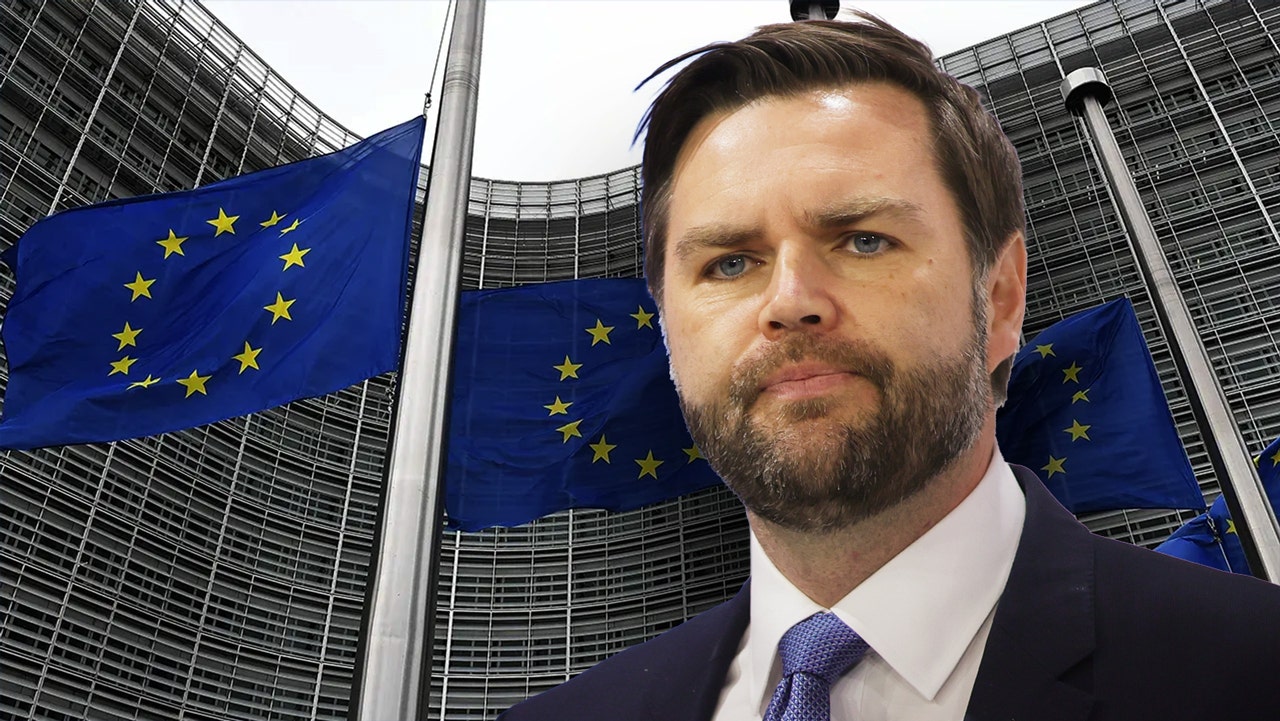



Discussion about this post